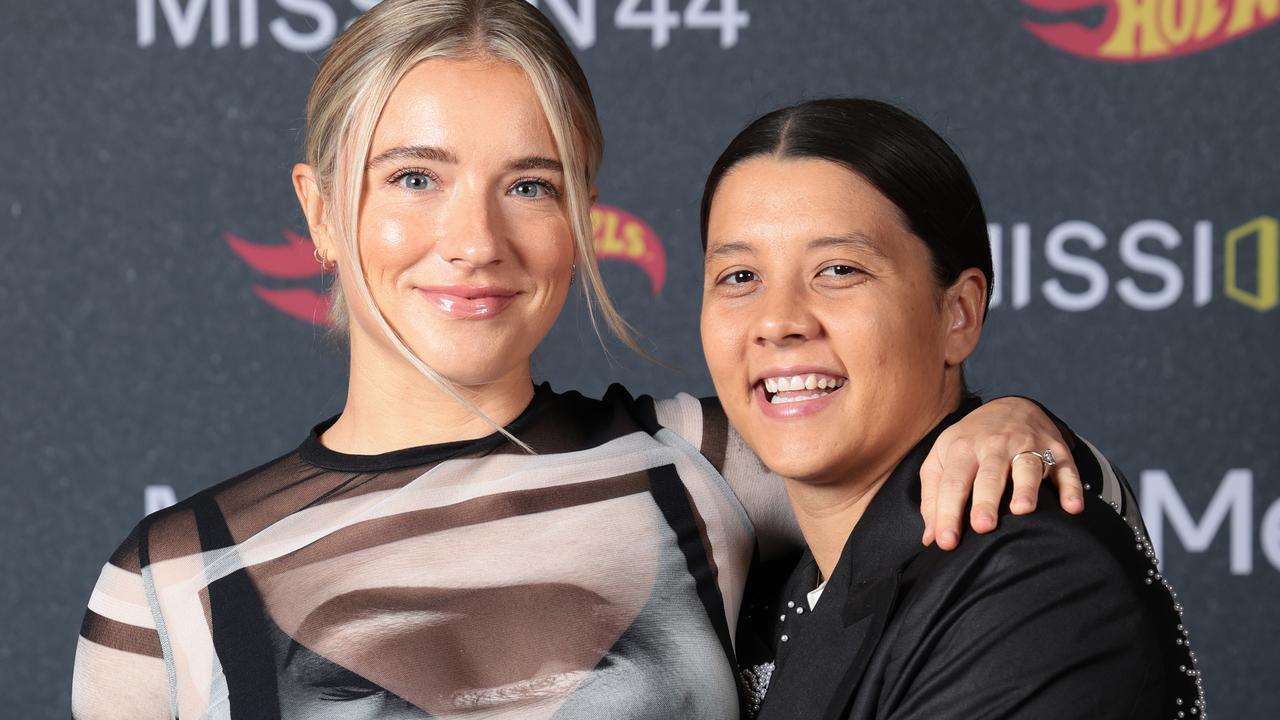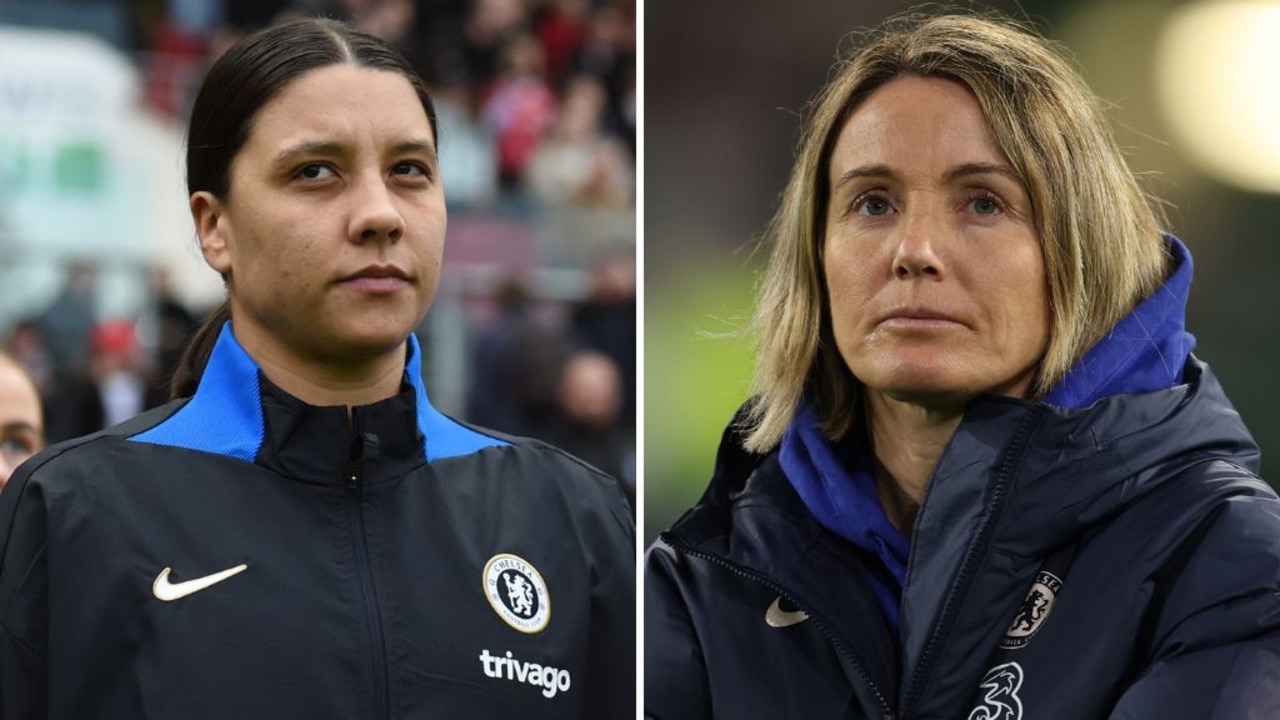Adelaide United’s Josh Cavallo on his new status as a gay icon and why he was sick of living a lie
In a heartfelt interview, Adelaide United’s Josh Cavallo reveals the highly personal reasons that drove him to declare he is gay – and become a global trailblazer.
Football
Don't miss out on the headlines from Football. Followed categories will be added to My News.
The number 27 has always been important for Josh Cavallo. The 27th is his parents’ wedding anniversary. The 27th was when his beloved grandfather died. He wears the number 27 on his Adelaide United shirt. The 27th was the day he decided he would tell the world that he was gay.
“I wanted to do it on the 27th because that’s my number,’’ Cavallo says. “It’s a very special number in the family.’’
Cavallo carries two tattoos on his left arm. Both are tributes to his grandfather who passed away seven years ago and who Cavallo refers to as his “best mate growing up”. One is the date in Roman numerals of the day his grandfather died, the other says “rest easy”.
Cavallo’s been thinking a lot about his grandfather these past few weeks.
“It seems like yesterday (that he died), to be honest. I miss him heaps,” he says. “I just want to make him proud.”
When we meet for a coffee in the ground floor of his apartment building, the previous 48 hours have been a whirlwind. Cavallo went from being a virtually unknown Australian footballer to global icon, after coming out as the only gay male professional footballer in the world.
When it comes to breaking taboos, this is as big as it gets in the world of men’s sport.
If it seems a big load on the shoulders of a slightly built 21-year-old who is still in the infancy of his football career, then Cavallo seems more than happy to carry it. As he sips his long black, Cavallo expresses wonderment at the reaction to his announcement and some regret that he didn’t take the step earlier.
“In the last two days the sense of relief, and the happiness I’ve got inside me – I can go to sleep with my head on the pillow and I’ve got pride and happiness and joy and I’m just smiling and I haven’t done that for six years,” he says.
“I forgot how that feels like. It’s crazy.’’

Cavallo has received messages of support from some of the highest profile players in the world, including Manchester United’s Marcus Rashford and David De Gea, Swedish superstar Zlatan Ibrahimovic, Barcelona’s Gerard Pique, as well as from clubs such as Bayern Munich and Liverpool. He has made new celebrity mates as well. Ricky Martin, Sam Smith and Ellen de Generes all sent messages.
On Twitter, he went from 100 followers to 33,000. His Instagram numbers ballooned to 140,000 from 10,000. The day before we meet he ploughed through 40 interviews in 12 hours with news outlets from all over the world.
But while all this is a source of delight to Cavallo, it isn’t the reason he decided to tell the world.
“Actually, I didn’t think it would blow up like it did to be honest with you,” he says. “The only reason why I came out is because I wasn’t happy with myself and I just wanted to be happy.”
Cavallo says it’s been a six-year journey to get to this point. He was 16 when he accepted he was gay. For a boy who grew up in Melbourne wanting to be nothing but a footballer it was a difficult realisation.
“I looked up and there were no footballers that were gay,” he remembers. “And I was like, ‘oh, maybe I can’t do that’. I can’t be happy and play football and I have to choose one or the other.’’
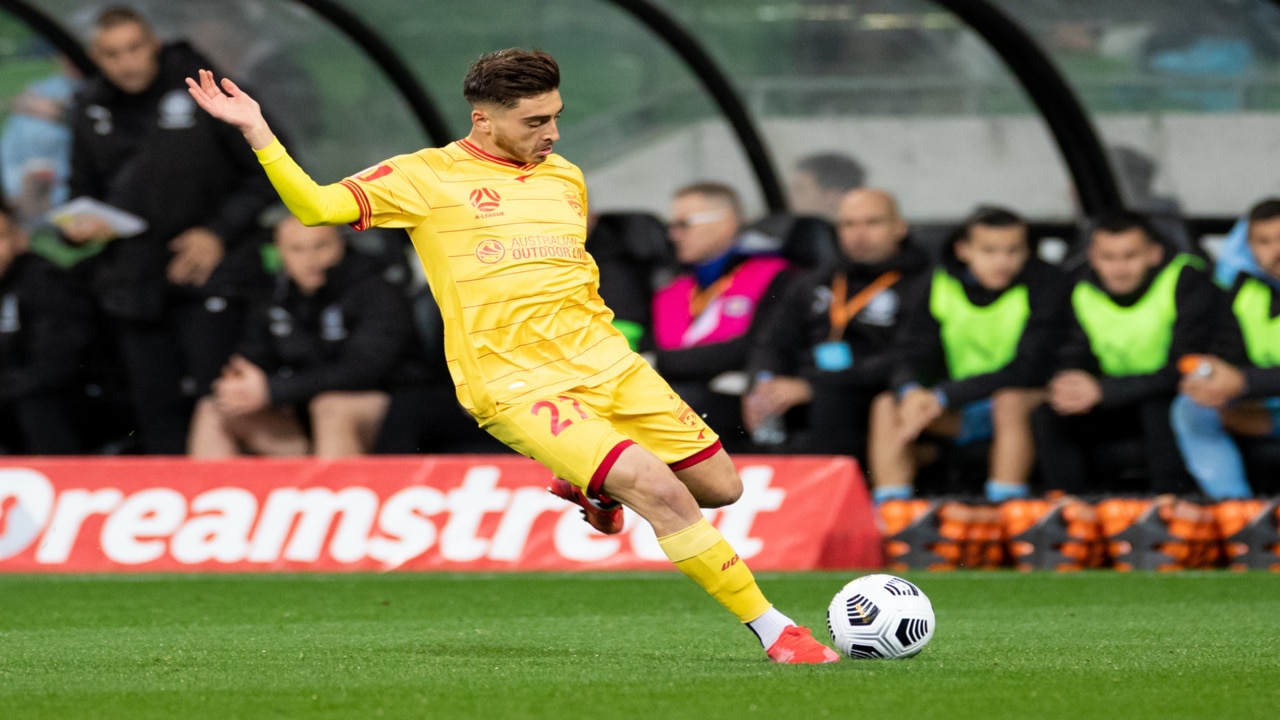
Cavallo played in youth teams at A-League clubs Melbourne Victory and Melbourne City before making his professional debut for Western United, then signing for Adelaide in February this year.
Wherever he played though, Cavallo always felt he had to hide his true self. That he couldn’t answer any questions honestly in case an answer didn’t add up and lead to other suspicions. He says he became an expert in lying.
“And it could be just a simple question, like, I’m talking about the weather and I would lie but there’s no need to lie. It’s just me being protective of myself,” he says.
“Honestly, you just become really, really good at it, because you’re doing it 24/7 … doing it to your family, doing it to your best friends, doing it to your job.
“It’s very sad when I think about it. I’m just so grateful that it was only six years.”
It’s also an exhausting way to live.
“You’re just on high alert all the time, thinking of situations or conversations I’ve had throughout the day and if I said it the right way or if I said something, that would leave them suspicious,” he says. “You’re always replaying it in your mind and just … a never-ending videotape going on in your head. It’s hard. It’s really hard.”
Cavallo often felt isolated and lonely. It affected his mental health, although he was too scared to see anyone. Many times he contemplated stepping away from the game he loved.
“I didn’t even want to go and get treatment for that because I didn’t want to tell them that I was gay either.”
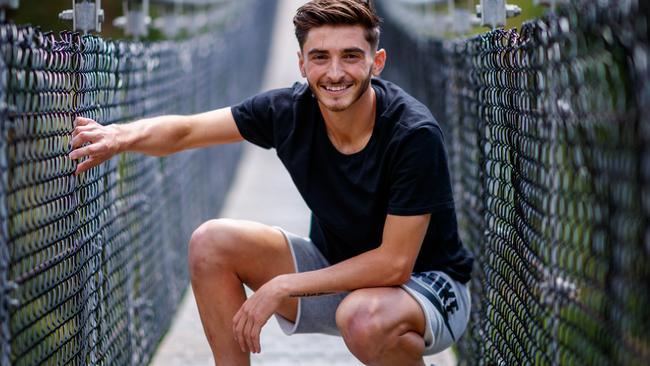
Cavallo knows it’s a battle many other young, gay players have lost. That the stress of living a double life was just too much and they stepped away from the game they loved and the dreams they had.
“I can guarantee you there’s people that have been very talented footballers, or in any sport, that have stopped playing because they feel that they’re going to get judged and that’s wasted talent, that could have been like the next Messi or Ronaldo.”
Cavallo understands that tension. Even on the field, a sanctuary for so many, he couldn’t escape the thought that he was going to be exposed at any moment.
“Before it was like … when I’m playing games or training, I’m worried about the conversation in the change rooms afterwards,” he says. “It’s very confusing and it’s draining, it’s tiring.”
All of which means, Cavallo says, that he is going to have to “unlearn” some of the behaviours that have become ingrained within his personality. The lying, the evasion, the paranoia.
“It’s something I’ve done for six years and it’s not something I can undo overnight,” he says.
Even when Cavallo was receiving plaudits for his talent, he wasn’t happy. When he won Adelaide United’s rising star award this year, it didn’t fill the void.
“As a professional athlete, you want to perform at the best of your ability. And this was stopping me from performing to the best of my ability,” Cavallo says.
“People were saying I was such a great player last year, but I was like ‘no, I wasn’t myself’. I was playing six out of ten because I was thinking about this stuff.”
A turning point was reaching out to former English professional football player Thomas Beattie.
Beattie played professionally in Europe, North America and Asia and came out after he retired. He is one of a handful of former professionals who have come out.
Justin Fashanu was one of England’s most promising talents, who came out late in a career that never fulfilled its early promise, when he became the first black footballer to be transferred for £1m when he moved from Norwich City to Nottingham Forest in 1981. Fashanu came out in 1990 and ended his own life in 1998, aged only 37.
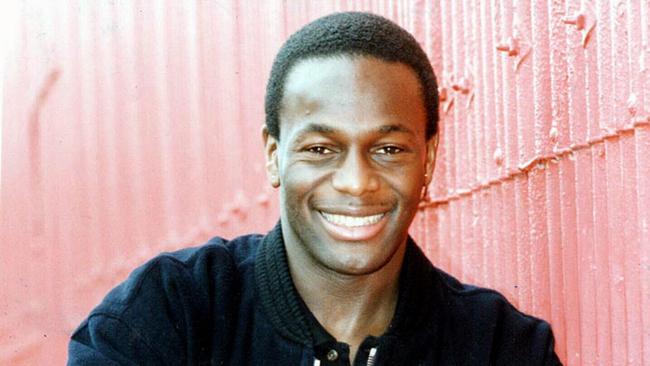
Former German international Thomas Hitzlsperger is probably the highest profile ex-footballer to confirm he was gay after his playing days were over.
Earlier this year, Cavallo contacted Beattie through Instagram and a friendship started that was crucial to the Australian deciding it was time to tell the whole truth about himself.
“He has worked closely with me for a long time now and he said to me ‘Josh, you can have both, you can change the world, you can do this’ and he opened my eyes to doing this.”
Cavallo says part of the reason he decided to go public was to help other young gay people who are facing the same kind of confusion and anguish that he and Beattie have dealt with.
“I want to help change or save someone’s life,” Cavallo says. “There could be someone on the opposite side of the world dealing with the exact same pain as what me and Tommy went through.
“It could lead to suicide or take them to dark places. But I want to share the positive side of that and look at the reaction I’ve gotten and how happy everyone is from it.”
The overwhelming positive global reaction does raise the question of why any gay male athlete needs to hide their sexuality. It hasn’t been an issue in women’s sport for many years now, but the male side of the equation has been different.
There is something about the overtly macho, boys’ club mentality of men’s change rooms that did not make it comfortable for a gay man to entirely reveal their true selves.
Cavallo believes it just needs one player to take the step and others will undoubtedly follow.
“And hopefully in like, two, three years, we don’t even talk about this subject anymore,” he says. “Times are changing, we are in 2021. I believe that the game is evolving with this. It’s great to see.”
Cavallo says the atmosphere within the Adelaide United squad also made it easier. We meet after Cavallo has trained with his teammates for the first time since the big announcement. He says the club culture and the unity of the squad made his decision easier.
“No one treated me any differently today,” he says. “Even in the locker room getting changed, it didn’t feel uncomfortable, they didn’t make me feel uncomfortable. And that’s how it should be. I am not any different.
“Six years ago I was still gay and I was still in the change room, just no one knew about it.”
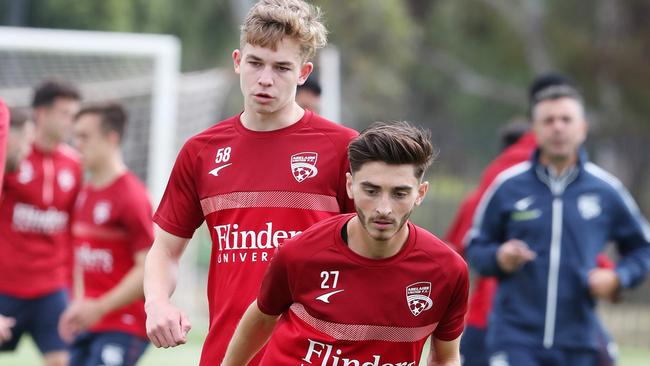
Adelaide United assistant coach Ross Aloisi was the first person in Australian football that Cavallo shared his secret with. Aloisi had been worried about Cavallo during pre-season. He thought Cavallo was not his usual self; he’d stopped smiling, and Aloisi was worried that he was struggling with his mental health.
Cavallo assured Aloisi he was fine but the coach wasn’t convinced.
“Josh said he was okay but he clearly wasn’t and that was that was very, very clear,’’ Aloisi says.
Around two months ago, Aloisi was in his office. It was early, around 7.45am when Cavallo walked in and said he had something to tell the coach. Aloisi’s first thought was that Cavallo had a mental health issue.
“He said, ‘it’s not mental health’ and I said ‘what is it?’ and he said “I’m gay’,” Aloisi recalls.
The coach told him that was fine and asked Cavallo what he could do to help. They spoke for 45 minutes then head coach Carl Veart came in and Cavallo shared it with him as well.
“He was scared to tell us, he was scared of the reaction of the players,” Aloisi says.
Cavallo was shocked by how well his news had been received, but Aloisi told him: “Josh, No.1 thing is you as a person, football is secondary. You are still Josh, whether you’re gay or you’re not gay, you’re still the same Josh that we all know and you haven’t changed.”
Over the next few weeks, the talk turned to how to handle the next steps. Aloisi and Veart offered their support, but the players still needed to be told, and Cavallo addressed them as a group 30 minutes before he released a video where he confirmed he was gay.
“It was quite emotional, the way the players all embraced Josh and applauded him,” Aloisi says. “It was a special, special occasion, not just for Josh but for the playing group as well.”
Aloisi says the change in Cavallo has been noticeable, going back to the day two months ago when he acknowledged his sexuality.
The two spoke after Adelaide played a pre-season game in Brisbane on Sunday and Cavallo told Aloisi he played “with a lot of freedom in his mind”.
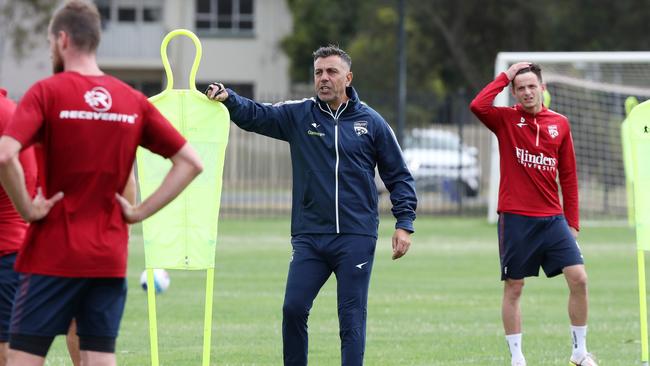
Unusually, in this social media age, there has been no backlash that Cavallo has spotted to his announcement. He’s also composed about what is ahead of him for the year ahead. Football fans can be brutal to opposition players. In the AFL, the racist abuse of Indigenous players has been an ongoing stain on the game but Cavallo says he’s not expecting abuse for being gay.
“It’s evolved. I don’t think that’s going to be the case. Everyone’s pretty accepting, you don’t go down the street and see gay people get abused and stuff like that. So, I think we’re ready for as it as a world.”
Cavallo is upbeat for the season ahead, which starts for the Reds on November 20 in Perth. He believes the Reds are a genuine championship chance and he wants to see how far he can push his own game. Part of that will be dealing with his new-found fame. He’s going to be watched closely by millions of people all wishing him well.
His life will be very different from now. He is a sporting icon, a gay icon. His views on all sorts of social issues now carry a currency they didn’t have two weeks ago. His career will be tracked by football fans and those who never before had an interest in the game. He is likely to be inundated with offers of sponsorships and corporate backing that will change his life financially as well.
Amid all that, Cavallo is still a young man trying to carve out a career in the biggest sport in the world.
The former Australian manager Ange Postecoglou was asked about Cavallo at a press conference in Glasgow, where he is now in charge of Celtic, and said he hoped the Adelaide player would be allowed to just get on with his career.
“If I have got one wish for him is that he’s just allowed to enjoy his football now and become the best footballer he can be, which I’m sure is what he had dreams of as a young man, as a young boy and hopefully he is allowed to do that.”
Cavallo certainly has big plans for himself. He wants to become the “best left back in the world”. He wants to play in an overseas league. He wants to move on from being that six out of ten player, to being a 10 out of 10 player.
He’s clearly excited about the next steps. Despite an exhausting, exhilarating 48 hours, there is still a smile on his face.
“I’m just glad that at the age of 21 I can do this and shake the world and have this career ahead of me,” he says. “I don’t have to worry about this stuff. I’m just excited to get on with the future and show what I can do now that I’ve got a free headspace.”
If you or someone you know needs support, call Lifeline on 13 11 14 or visit lifeline.org.au
More Coverage
Originally published as Adelaide United’s Josh Cavallo on his new status as a gay icon and why he was sick of living a lie




